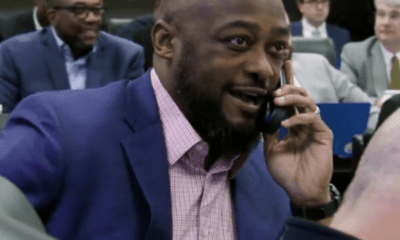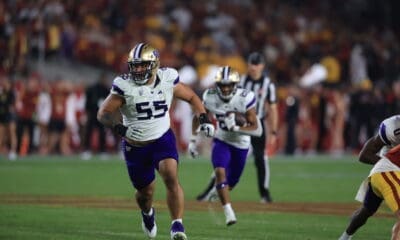Uncategorized
Interview with Former Steelers C Fernando Velasco

Our Ron Lippock spoke with former Steelers center Fernando Velasco, who started 11 games for the team in 2013 after Maurkice Pouncey went down with an injury in Week 1 of the regular season.
First, tell me about your new role as Player Relations Coordinator for the University of Georgia. How it got started and what are you doing?
I’m here to help out the kids as they transition into college and after college. To help them find that first job, whether it’s in the NFL or an internship or a job in corporate America. Preparing them for life outside of the NFL.
Was it a tough transition for you after football?
I think the transition is tough for everyone. For me, the key was having a plan. To have an idea of what I wanted to do. The big thing was, I got my degree. No matter who you are, football comes to an end.
Even talking to past guys, yes there’s a struggle for some of the guys from a financial standpoint. But more from the standpoint of not having your life so scheduled, not having your itinerary mapped out every day. From that, to nothing, really. That’s a big part of it too.
And, to find something you love to do. I’m doing what I love to do now – helping youth and giving back to the community. Georgia was good to me since I stepped on campus. I know what it did for me so I want to help give back.
You’ve spoken some about being raised by a single mother and your grandfather. How has that effected you and has it helped inspire and help you too?
Oh it helped a ton. That’s what we do. We relate to kids every day. I loved playing football and playing on the offensive line, but to be honest, I’m tired of football. I’m glad I’m not coaching and watching film any more. My main objective now is helping kids with their daily lives and developing young men. There are a lot of kids here from single parent homes with no fathers. It’s a passion of mine because I know what they are going through. It’s a struggle, a societal problem: fatherless kids. For us, we’re trying to fill that gap with mentors and coaches. The coaches here treat everyone like family and my director comes from a similar background as well. This is what we do on a daily basis.
There area a lot of people who just don’t understand that these kids are at risk, these kids from fatherless homes. We just want to help single moms when they drop off their sons to help them prepare their sons for life.
You overcame that single-parent upbringing, then came into the NFL as an undrafted free agent. How did that affect your approach to the NFL as well? Does that ever leave you?
No that never leaves you. And it shouldn’t leave you. It motivates you. Gives you a chip on your shoulder. It’s been the story of my life, being the underdog. I’ve just allowed a higher power to take it’s course. But it’s helped me make sure to go the extra mile and that I do the best I can every day. You get no benefit of the doubt as a free agent. You know sometimes life is unfair but that just gives you a chip on your shoulder.
You never forget that mindset. And it’s a blessing because I’ve known guys that were drafted and didn’t last in the league as long as I have. It kept me focused. It’s just the way this business is set up. You can perform better than a drafted guy but they’re invested in the drafted guy so they’ll get the benefit of the doubt over you. So it keeps you on your toes.
What drove you as a free agent and veteran to sign with the Steelers?
Wow. It was the Pittsburgh Steelers, just playing for a storied franchise like that. My first five years I played in Tennessee. When I walked in to Pittsburgh and you see those six Lombardi Trophies – you just know that’s always the standard there, that’s always the goal. And playing for Mike T. It’s a special place. I was happy I got a chance to experience it. I also knew I’d have an opportunity to play when Pouncey went down with his ACL injury.
You seemed to step in seamlessly and started 11 games. Why were you able to do so?
It’s due to the guys in the locker room. It’s nothing I did. Ben, he knows the offense like the back of his hand. He helped me in ways nobody knows. In helping call offensive line protections, calling out the Mack [linebacker], helping me out with calling protections. He is so knowledgeable in that offense and how they set protections.
People think I made it look easy, but Ben and Ramon Foster, too, those two guys helped so much — and Pouncey. Even though he was hurt, he helped me every step of the way. That shows the character of the man too. None of them knew me from dirt, but they all helped me. That’s why I still root for them today and see how they’re doing. Those three guys are still playing at a high level. I respect those guys so much.
Any fun stories that stand out to you of your time in Pittsburgh?
Oh yeah! The year after I left Pittsburgh I went to Carolina in free agency. My good friend Jarvis Jones — a Georgia guy — was in Pittsburgh then. Well, we were playing a preseason game against Pittsburgh and there was a fumble and Jarvis picked up the ball and took off running. I didn’t see who it was, I just saw a guy running and tried to catch up to him and all I could grab was his hair, so I grabbed him by his hair and dragged him down. Then I saw it was Jarvis and I thought ‘Aww shoot!’ I told him I didn’t mean to do it. We still laugh about that. That was a fun story for me.
Lastly, especially as a guy who develops kids for a living now, any advice to guys in the NFL today?
Yeah, always respect the game. Think about the guys that came before you and paved the way for you. You can’t cheat the game and fool people. Work hard as possible every single day.
And on the flip side, from a financial standpoint, understand your money. A lot of guys — especially when they transition out of the game — they rely on advisers. That’s OK to have financial advisers, but you have to realize money just gives you options. So you can do what you want to do, not what you have to do. You have to make sure you understand stocks and bonds and investments. You have to educate yourself on what it all means. Don’t just trust someone else with your money and future. You need to make sure you’re setting yourself up well for the long run.














